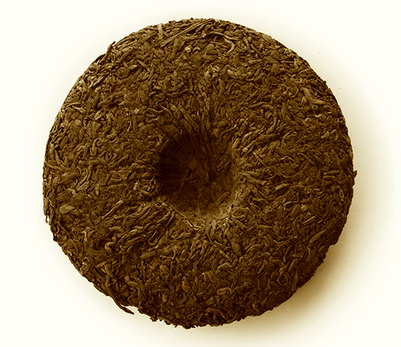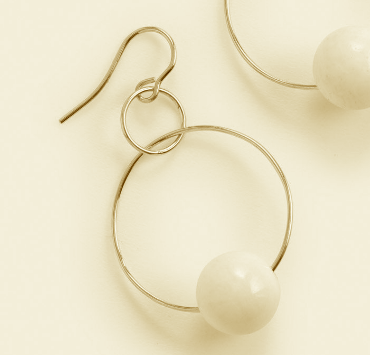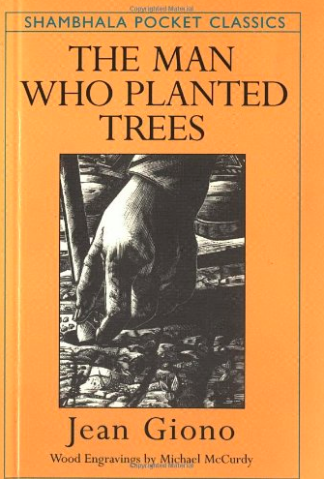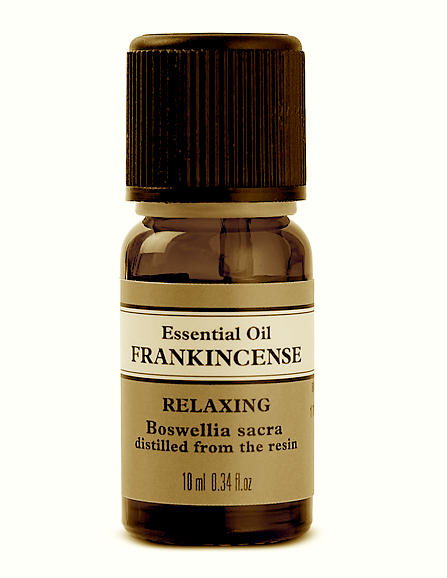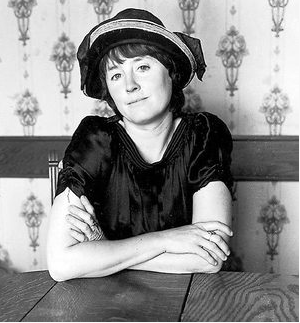
I could never live my life without thinking about the room to work in, and people that I like around me.
Alice Waters
Luckily I had stopped crying before Alice Waters arrived for our lunch at Chez Panisse. What can I say? It was moving to be in the restaurant that she created almost 50 years ago—not unlike that feeling you get while standing in front of a beautiful painting or listening to a great piece of music. Everything from the vintage French movie posters on the walls to the plates of simple, seasonal food on the tables reflected her vision. The staff had the feel of family. And, of course, there are the bigger intangibles, such as how she has helped to revolutionize the way that we grow, cook, and eat food in this country.
I’ve been lucky to have gotten to know Alice, initially by interviewing her for stories on farming, and then through Edible Schoolyard. (I’m on the board of the New York chapter.) At some point we ended up at a rural cooking school in Tasmania together, but that’s another story. What has always impressed me about Alice is that while she may seem airy — her soft voice, her Dosa outfits, her meandering, contemplative, subtly emphatic way of talking, in which you have to go back after you’ve transcribed the interview and remove a few periods to get to the sentence — she is one of the most focused and determined people I’ve met. Even when she’s explicitly not answering your question, she is leading you to the message. And what a powerful message it is.
So it was an honor to share a meal with her and talk about parenting, cooking, and how tortillas might be the solution to loneliness.
Xtine: What gave you the courage to do this when you were so young?
Alice Waters: It’s always been about the civilized life for myself [laughs]. What do I want for myself, you know? I want the place that I work to be beautiful. I want the kitchen to be beautiful. I want to be able to see people. They’re eating my food – I want to be able to look out there. And then I want to be able to walk out there.
Was there something about not knowing what you didn’t know that enabled you to persevere?
Without any question. Because we threw all of that away, the way restaurants were run. We were running the restaurant like we were cooking at home.
In the early days, what were you afraid of that seems ridiculous to you now?
[pause] It’s so strange: I was never afraid of losing money. I never thought about money. I just wanted the food to taste good. At the beginning, I was terribly anxious, and so I would give away food. I’ve always been afraid about waste. It’s the reason I love the compost: I like it going into the ground and growing the vegetables. I don’t know what I would do – I’ve had times in New York where I’ve just brought all of it home in a bag! [laughs]
We finally have it in New York, but it’s still in the early stages. I’ve sometimes taken the compost to meetings in my bag and had it spill all over. Now there’s a composting station on the way to my son’s school.
How old is he now?
Six.
[sighs] Six to 12, they’re yours. Actually, it’s gone down a little lower. It’s more like 10. When they want their friends. But right now, till they’re 9 or 10, you can take them on a trip and they are wonderful. So do that now. I took Fanny to France when she was eight, and because she spoke French, she took me – she translated, looked at the map. You’ll read her memoir, which is coming out in the fall. She’s a great writer – she has beautiful language. All of her senses. She’s like Colette in a way like that. And she’s funny. She makes good fun of me [laughs]. But she talks about that trip to France. Every thing at this time is something that is really feeding their memories. Some kids have exceptional memories that go back to age three, but most kids are five or six on. So those are childhood memories that they’ll never lose. I remember that part of my life, too, very distinctly: trips we made with the family, what the cabin was like up in New Hampshire, where the rooms were, mosquitos, calamine lotion, the tar melting on the streets…
That’s a good reminder. Thank you. In the beginning of the restaurant, how did you define success vs. how you do it now?
You’re asking all the hard questions!
You talk about vegetables all day. I’m giving you time off!
I really defined it if the restaurant was full! If people liked it. If people came back. If we had regular customers. If different ages came in. I define it more about that now than I ever did. I love that we are in a university town. I really want the restaurant to appeal to all sorts, from all cultures. And it’s happening. We put on a late-night steak frites with a glass of wine for $25.
This is a selfish question, but how did you parent while doing such a full-body job? And is there any advice you can give?
Men, women and children need to participate in the finding of ingredients, the preparing of the meals. It cannot be left to the mother. The sooner [kids] learn, the more excited they are, I have found. It just should be understood as a family activity.
You had Fanny when you were…
39.
One of the questions younger women ask me is when is the right time to have a kid. What do you tell people?
You have to do it when you have the right partner, and you can imagine having a life together. You can’t wait, like I did, until I felt that real, deep urge. And I was lucky. Many of my friends wanted children and never had them because they waited too long.
If I’d had a kid younger, I certainly would’ve had more energy, but I don’t think I would have accomplished what I did work-wise.
Well that’s the way I felt. But again, purchase your food not only with family but with friends. So maybe it’s one day you cook the meal and I come over with my kids — so that you aren’t just a little threesome. When you cook something like these turnips, it’s just an easy thing to do. You can make a meal in 20 minutes. It’s just spending a few pleasurable moments at the farmers’ market.
I think we have so much pressure to make a beautiful, complicated dish.
Well, what’s more beautiful than that? [points at the plate of turnips] I mean, Fanny would eat two bunches, just like that. We need a vision of how this can be done, because people learn by doing. Which is why I’m so obsessed about schools having garden and kitchen classrooms, where they do their mathematics in the garden. They do their history of culture in the kitchen. Their language. They’re learning this effortlessly while they’re digesting the information for the class, and they’re getting graded on it. This isn’t an add-on, this isn’t gardening or cooking class. And we can make school lunch that way too. And it will become a delicious place of study!
I loved the placemats that you had made for school lunches.
We’ve forgotten what it’s like to eat at the table. When 85 percent of the kids in this country don’t have one meal there, what are we doing? It’s like a run-on sentence. Because I know that kids complain about that in college, they’re all on their computers during a meal, and there’s such a pressure to get things done. And they have no time where they’re socializing. They don’t even know how to meet people. So I’m just hoping that we can all really come back to our senses! [laughs] It has to become a practice. I mean, I never thought that I could exercise. I was always thin and lucky when I was young. Then I had Fanny. I gained weight. And I had a divorce. My friend said, Come walk with me. We used to walk. And talk. And that was 25 years ago. And every single morning, I go out and I walk. I walk wherever I am. And it’s very important habit that I developed, because I’m connecting to nature: Is it raining, is it snowing, what flowers are blooming – I wake up during that time. I go for an hour, I come back, I have my tea.
It was interesting being in your home: I could tell how important rituals are to you.
I love to set the table. I love to light the candles. Even if it’s not a fancy dinner.
What are some other rituals that are important to you? Tea is always a big one.
Tea is. I always choose the pot and the café au lait bowl—even if I’m not drinking my café au lait anymore. I bring my tea with me wherever I go. What other rituals do I have?
Bath?
I usually take a bath every morning. It depends. Sometimes with Epsom salts. Always with frankincense Neal’s Yard aroma in the bathtub.
Why is having rituals important to you?
They really ground you. It’s like with all the days of running around, being on the phone, talking to this person and that person, then I just stop. I love watching TCM. I love it at the end of my day. And I never think about what’s on. I love the fact that I cannot choose. I’m brought into somebody else’s world. I also have hundreds and hundreds of books.
Books are very much a part of your home.
They are. I feel like they’re all these friends. Not that I’ve read all of them!
But I also felt like you must’ve known so many of the authors. It’s like, oh, there’s Mark Danner. There’s Michael Pollan. There’s Werner Herzog. The books are part of your family.
They are. I’m just comforted to look up there. The Wendell Berrys—right at that corner.
When do you read?
I need to be reading when I have a kind of clarity of mind. I find that I have my best thinking from 5 to 8 in the morning. I usually go for a walk at 7:30. If I get up at 6 and I pick up Wendell’s “The Unsettling of America,” I can read a chapter. That book is so important, because we’re going to have to do a reset in America, and so the unsettling is so important to know about. He knew what was coming. And it’s come! More scary than he ever, ever imagined.
How else do you find clarity? I can’t even imagine what your schedule is like.
It really helps to have dinner with one person, not eight. Have a real conversation, where you’re listening to that person.
Gabriela [Camara, of Cala in SF and Contramar in Mexico City] and I were talking about mentorship and how much advice you’ve given her over the years. Who are your role models?
One of them is hers: Diana Kennedy. I was lucky to know Elizabeth David, Julia Child, Edna Lewis, Lulu Peyraud, Diana Kennedy. Diana gave me the instruction that, one, you can do it. It’s not complicated to do.
It’s not complicated?!
It’s not complicated. You get the right ingredients, you can do this. And they’re all purists. They were buying in the market, they were eating slow food, they were discovering what the people of that place loved. I have now four nonagenarians that still are in my life. And I see that certainly Lulu’s rituals have helped her. She’s 101 now. We just went to see her. She swings on the swing. She writes down, before she goes to bed, everything she did that day. And then she wakes up in the middle of the night and she listens to the French equivalent of the BBC so she knows what’s going on. She drinks two glasses of wine at lunch so she can have a good, solid nap every afternoon. She’s always wanting to meet new people, always wanting to know what they’re thinking. She’s great.
What’s some work or life advice that you give but don’t take?
I have to say, I like advice. Life advice is about meaningfulness. That’s what I think one of the – aside from loneliness in this country – it’s lack of meaningful work. It’s not knowing how to even do simple jobs well. How to make those meaningful. I could never live my life without thinking about … the room to work in, and people that I like around me. I’d rather sell my own bouquets of violets on the streets of Paris before I went into some space where people didn’t care about you or didn’t smell good! We have to resist this way. This isn’t civilized. That’s why I’m hoping that people can find farming absolutely essential – taking care of the planet, growing food for their family, friends, and schools. It could be just as creative an experience.
My parents had their victory garden for their whole lives. I’ve tried to get that victory garden movement going [laughs], that we plant everywhere. Think about college campuses: Why can’t there be an edible landscape?
Okay, this is a tricky question.
Oh, another tricky question!
How have your managed your disappointment in the political system? That’s something I’ve seen w my friends who came of age in the 60’s. They’re just…
How do they manage?
They got really depressed.
I have to really work at it, that I’m not being overwhelmed with what’s happening. And nature helps, for sure. I think it’s very hard to live alone. It’s one thing when you’re young, but it’s very hard when you’re older. And I think we have to figure out a bigger way – and I was promised from the time I was 30 that I was going to have a commune. I am really working on that. And I want it to be working and intergenerational. I do not want just all old people in this commune. So we have to have some kind of work that’s connected to it. My latest idea, which Gabriela and I are working on, is a tortilleria. If we had a tortilleria and we curated like a newspaper— a paper to wrap the hot tortillas in. We could have a printing press and a tortilla press. And we would call it Hot Off the Press! I’ve always seen it as a mission arrangement, you have small rooms around the perimeter, and a business in the front.
Count me in.
Count you in!
How do you maintain your friendships?
With my friend Davia, we go places together. And I have Sunday dinners with my friends Bob and Tony, where I buy the food, and we haven’t decided what to cook until they get there. I’m doing two more books; one of them is with Bob, called “Manifesto,” which is we are what we eat. And the other is a handbook for what school lunch could look like. What time is it, by the way?
It’s 5 to 2.
[laughing] I have to go right now! I have the woman coming over who’s working on this book!
